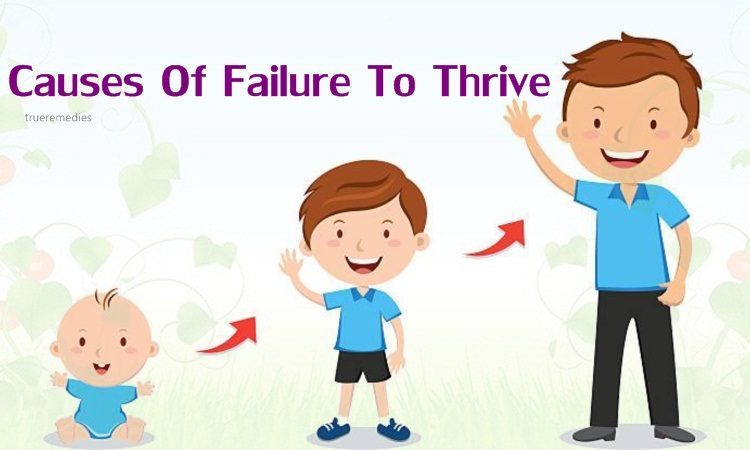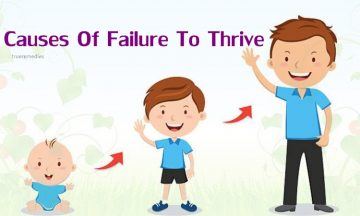Table Of Contents
Kids development and growth are what parents and everyone pay attention to parenting. Most kids will gain weight and grow fast within their first few years of life. However, some cases do not meet our expectations. While some kids are not interested in eating, there’s “fail to thrive” even though they have been eating well. Both situations result in undernourished kids with weak height growth. There are a lot of causes of failure to thrive in babies that we, Trueremedies.com, want to mention. Once, you find out the possible reasons for this problem, you and your family’s members can help your child get the standards of growth.
- Top 16 useful tips to prevent birth defects
- Top 19 toxic things to avoid feeding your baby
- Bath time dangers for babies under four years old
- 36 best home remedies for lactose intolerance (This article was medically reviewed/fact checked by Millie Lytle ND, MPH)
Possible Causes Of Failure To Thrives – What Parents Need To Know
I. Baby Weight Gain And Growth – What Is Normal?
Healthy infants have different sizes and weights, even when they are born. But the ideal path of infant growth that ensures the best development for your kids is the same and predictable. That requires the mother to measure their size regularly and mark it with a standard growth chart.
Let’s consider these following guidelines for the baby’s growth and development within the first year of their life[1].
- In the first two weeks, it’s normal for a baby to lose weight because of breastfeeding and bottle-feeding. For example, breastfed newborns can lose 10 percent of weight while bottle-fed ones lose 5 percent. After two weeks, they will regain the weight they lost.
- From two weeks to 6 months in the first year, a baby is expected to grow about 1.5 to 2.5 centimetres a month with the weight gaining about 140 to 200 grams a week. The average weight of a six-month baby is about 7.3 kg for girls and 7.9 kg for boys.
- From 6 to 12 months in the first year, your baby’s growth and weight gain will slow down a little bit, but it still reaches about 1 centimetre and 85 to 140 grams a week. By the age of 1 year, your baby will triple his birth weight. The average weight of a one-year-old baby is 8.9 kg for girls and 9.6 kg for boys.
Here is the weight chart of a healthy, full-term baby. You should use this one to check your baby’s weight gain regularly.
| Age | Average Boy Weight | Average Girl Weight |
| 1 month | 4.5 kg | 4.2 kg |
| 2 months | 5.6 kg | 5.1 kg |
| 3 months | 6.4 kg | 5.8 kg |
| 4 months | 7.0 kg | 6.4 kg |
| 5 months | 7.5 kg | 6.9 kg |
| 6 months | 7.9 kg | 7.3 kg |
| 7 months | 8.3 kg | 7.6 kg |
| 8 months | 8.6 kg | 7.9 kg |
| 9 months | 8.9 kg | 8.2 kg |
| 10 months | 9.2 kg | 8.5 kg |
| 11 months | 9.4 kg | 8.7 kg |
| 12 months | 9.6 kg | 8.9 kg |
II. Why Isn’t Baby Gaining Weight
Here are several possible causes of failure to thrive in babies and toddlers:
TrueRemedies Partner Solutions

Need a Help from the Leading Expert Online, Available 24/7?
They’re all here and ready to answer your questions online or by phone. Keep asking questions until you get the answer you need.
- The kids eat too little: Many things, such as developmental delays, prematurity, or autism[2], can make your child lose his or her interest in food. Diagnosed with autism, your baby does not like consuming foods of particular tastes or textures.
- Parents give not enough food for their kids: This problem is caused by parents who measure the wrong formula for baby’s development and growth[3]. As a result, they offer too much or not enough food, causing improper calories intakes in babies. Furthermore, because some parents worry that their kids become fat, they restrict what give their infants.
- Improper feeding time: Another cause of failure to thrive is that parents fail to feed their baby at the right time because of busy and overwhelming working schedule. These parents often let their kids eat too much at one meal, which causes the problems in the baby’s digestive health and poor food absorption.
- The kids get improper nutritional balance: Paying attention to the nutrient need is more important than feeding your baby a lot. The nutritional balance is based on the kid’s age and daily activities.
- Parents feed their kids in the wrong way: The way how we prepare and cook food also impacts on the nutrient absorption in babies and children. Unfortunately, some parents mistakenly cook food, which causes nutrient loss or change. Furthermore, eating processed food is not suitable for baby and children’s health because they are high in unhealthy fat and refined carbohydrates.
- Problems and issues affect your digestive system: Several health conditions like cystic fibrosis, chronic diarrhea, gastroesophageal reflux (GER)[4], celiac disease, and chronic liver disease can cause the problem. Each condition affects a baby’s eating habits and needs in different ways. For example, suffering from gastroesophageal reflux, babies refuse to eat because of the irritated and painful oesophagus. A kid with persistent diarrhea experiences the trouble absorbing nutrients and calories from food. The child with chronic liver disease, cystic fibrosis, and celiac disease can not get enough nutrients, although they may eat a lot. Furthermore, the celiac disease makes kids allergic to gluten found in grains and wheat.
- Kids have specific food intolerance: That means they are sensitive to certain kinds of foods. For example, some kids with milk protein intolerance can not consume milk proteins in foods like cheese and yoghurt. So, it is easy for these babies to fail to thrive.
- Kids suffer from certain infections: Several infections such as tuberculosis, urinary tract infections (UTIs)[5], parasites, and so on result in long-term or short-term failure to thrive by affecting patient’s appetite.
- Kids suffer from disorders or ongoing illness: Health conditions that affect the lungs, heart or endocrine system[6] will make the child lose interest in eating.
- Kids are diagnosed with metabolic disorders[7]: A metabolic disease causes the baby’s body to vomit and avoid breaking down or take nutrients from food.
Sometimes the combination of medical conditions and environmental factors will increase the risk of failure to thrive. For instance, if your baby suffers from GER and lose their appetite, feeding time becomes stressful, and they will refuse to eat.
III. What Happens When Kids Are Undernourished
Failure to thrive makes your child undernourished. But if the problem continues, it not only stunts the healthy growth and development but also causes a lot of issues. For example, poor nutrition can harm a baby’s brain development.
Other problems include:
- Avoid eye contact
- Become fussy
- Lose interest in playing
- Fail to meet standard development milestones such as sitting, talking, and walking at a certain age
IV. Solutions For Success To Thrive
Seeing the signs of failure to thrive in babies, all parents worry and feel headache when looking for ways. However, forcing the baby to eat more food or take nutrient supplements without consulting doctors only causes reverse effects and makes your child stressful.
So, what should you do if your child fails to thrive within the critical first years?
After knowing the possible causes of failure to thrive in babies, here are the recommended solutions that help your child get back to healthy weight gain and height growth:
Solution 1: Balance Nutrient Need
Forcing your child to eat more only causes a lot of stress and puts pressure on his digestive system. That does more harm than good. Instead, you should feed them the adequate amount, quality and diverse food based on their needs of the age[8].
Also, to ensure food hygiene and safety, you should cook their food at home instead of buying processed food.
Solution 2: Boost Digestion And Nutrient Absorption
There is a link between the intestinal microbiota and digestion or nutrient absorption[9]. Thus, one of the most effective solutions is to give your kids different kinds of food that boost digestion, appetite and nutrient intake such as yoghurt.
Furthermore, you can let your kid take probiotics supplements, but it should be done with doctor’s consultant and recommendation.
Solution 3: Strengthen The Immune System
Having a healthy immune system can help your kids stay away from diseases and illnesses. There are several ways to strengthen the immune system in your child, and the best approach is to combine a healthy nutrient balanced diet and exercise.
Gentle exercise and playing can boost the baby’s digestion and make him hungry. You can also let your child take supplements, but that needs doctor’s advice and supervision.
Solution 4: Treat Medical problems
If medical problems cause your baby’s failure to thrive, you should address your child’s condition and seek proper medical care.
V. When To Call A Doctor
If you notice your baby loses weight suddenly or their appetite changes abnormally, it is crucial for you to call a professional doctor. Kids and toddlers may lose their interest in eating in several days or sometimes weeks, but that is a problem in infants.
Your doctor will address the possible causes of failure to thrive and recommend the best treatments if your baby has trouble eating.
Keep track of your baby’s health, growth and development over time. You need to make a regular appointment with your healthcare provider who can give useful advice during your baby’s first years. We hope that you find this article helpful and informative. Any questions can be left in the comment section, and we will answer them as soon as we can. Thank you for reading.









